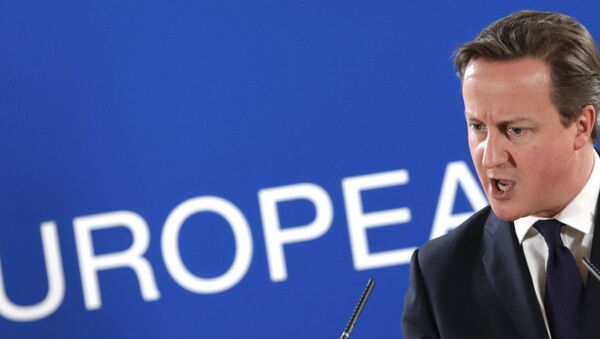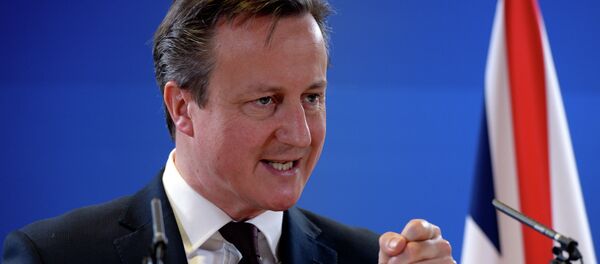Cameron won a working majority in the general election last week, but is now facing the test of his political life as he struggles to keep his own party in check, while also conceding powers to Scotland and attempting to make good on his in-out referendum on the UK's membership of the European Union.
He won an unexpected majority in the House of Commons and — having seen the resignations of Labour's Ed Miliband, the Liberal Democrats' Nick Clegg and Nigel Farage of UKIP — has sits pretty atop the UK political tree.
Thank you — now let's make Britain greater still: https://t.co/WVTT8qCjpr pic.twitter.com/xaiyCCLirx
— David Cameron (@David_Cameron) May 9, 2015
However, he now has to negotiate his way through the potential unravelling of the United Kingdom. Scotland voted to stay in the UK, when it went to the referendum last September, but the massive vote for the Scottish Nationalists in the general election last week is further proof that Scotland wants "devo-max" — a huge devolution of powers to the Scottish Parliament.
Boris Johnson will be attending my Political Cabinet. As promised, he will devote his attention to his final year as Mayor of London.
— David Cameron (@David_Cameron) May 11, 2015
I'll be completing the #reshuffle of the Cabinet today. You can monitor announcements here.
— David Cameron (@David_Cameron) May 11, 2015
With 56 members of parliament, the SNP now has massive political clout in Westminster and Cameron will have to grant it favours to allow them to take back more powers to Edinburgh. He will also have to ensure that England — as well as Wales and Northern Ireland — can also share some of that 'independence' that Scotland is afforded, while also keeping the United Kingdom in one piece.
Look at this breakdown of MPs in Scotland from 1955-2015. #GE15 pic.twitter.com/GGFQTMoIFQ
— Ross Colquhoun (@rosscolquhoun) May 9, 2015
European Union Membership
His second problem is that he has agreed to an in-out referendum on the UK's membership of the European Union, an issue which has divided his party in the past. Former Tory PM John Major's administration was brought to its knees over Europe and his defeat saw the Conservatives out of power for 13 years.
Cameron has to negotiate with Germany's Angela Merkel and France's Francois Hollande, in the first instance. They are both aware of the UK prime minister's pain: he wants to keep the UK in Europe, but needs to assuage the Eurosceptics within his party, who see Brussels as interfering too much in domestic affairs.
If there is an EU referendum, we must have double lock to ensure Scotland is not ripped out of EU against will says @NicolaSturgeon #Marr
— The SNP (@theSNP) May 10, 2015
Cameron will need to go to Brussels and emerge with a list of powers to be returned to Westminster, as well as a set of reforms of the European Union. He is hardly likely to win any reform of the Common Agricultural or Fisheries policies and highly unlikely to win support for the curbing of European Commission powers.
With a referendum upon us @euromove @BNE_Group @britinfluence are rolling up our sleeves to win argument for UK's future in the EU. Join us!
— European Movement UK (@euromove) May 8, 2015
With the Mediterranean migrant crisis continuing, he is also going to have difficulty fighting off cries for a quota system that would mean the UK having to take in its fair share of migrants — something that will incense Eurosceptics. But he may well be able to use that as a significant bargaining chip.
Cameron will press for some form of control over what benefits EU migrants can be given and for tougher border controls.
"now we have an In/Out EUref we need to educate our own activists and electorate on truth about EU" NW England @Conservatives voter Indeed
— Sajjad Karim MEP (@SHKMEP) May 11, 2015
His ace card is Greece, which is on the brink of leaving the euro if it fails to make its loan repayment deadlines to the International Monetary Fund, the European Central Bank and the EU. Merkel knows that if Greece exits the euro, it will cause a huge loss of confidence in the European currency. The IMF has already hinted at the dysfunction of the euro and any destabilisation of it would inflict permanent damage on the European project. Merkel and Hollande know that a Brexit would be even worse news. So, Cameron is likely to be able to win significant power-returns to London.
Backbench Revotling
However, Cameron's biggest problem are his own backbench MPs. In Coalition with the Liberal Democrats, he had such a huge majority that he could ride out any dissent. However, with only 51% of the seats, he has a slim majority that will empower critics within his party.
Having woken up on Friday to see his party swept to an unexpected victory and the resignation of his opponents, Cameron may well have thought he was unassailable. Yet he is now facing a fight to keep the UK together, inside — but at arm's length from — the EU, while also watching over his shoulder for the backstabbers.





